-
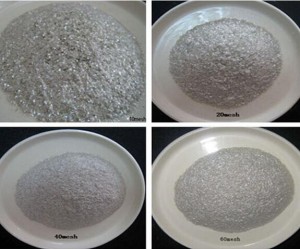
Muscovite Mica Powder Price for Oil Drilling
Dry Ground Mica Powder
1.Raw Material: best quality Lubaishan Mine
2.Manufacturing Process:
A.Dry impact technology to produce high purity white mica powder will not change any natural
properties of mica;Whole closed production filling ensures high quality of Mica.
B.Unique Classification Screening process patented technology to ensure high quality stability and uniform powder particles size distribution.
Product Description
High Thermal Stability Mica Mineral
Mica- A temperature-resistant filler
1.Descriptions of Mica
Product Name: Muscovite Mica
Synonyms/trade names: Potassium Aluminium Silicate Mica
Appearance: Powder/Flakes
Colour: Light-coloured muscovite
Solubility: Insoluble in water.
2.Features: 1)Laminar particles 2)High aspect ratio
3)Hardness of 2.5(Mohs) 4)Density of 2.85g/cm3
5)Low Oil Absorption 6)High Thermal Stability
Why Choose Us?
Advantages we have:
1.Have cooperated with a lot of importers for many years;
2.Experienced in doing business with big customers;
3.Fast Delivery,10working days/20’GP.
4.Advanced Production Lines and Inspection Team to do the quality control.
5.Professional R&D team and sales department for your service;
6.8/24 service for you, all the question will be dealed within 24hours.
-
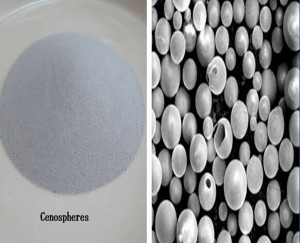
High Insulating Cenospheres for Paint Coatings
Cenospheres are unique free flowing powders composed of hard shelled, hollow, minute spheres. A small proportion of the pulverised fuel ash (PFA) produced from the combustion of coal in power stations is formed as cenospheres. The main characteristics are: •Hollow spheres with spherical morphology. •Particle sizes ranging from 5 to 500μm in size. •Ultra low density. •Low thermal conductivity. •High particle strength. •Resistant to acids. •Low water absorption The main application in that of a... -
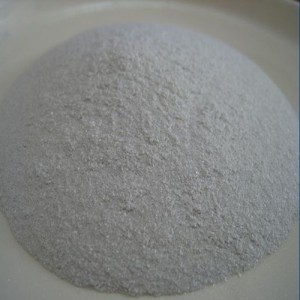
16 mesh Natural Mica Muscovite Flakes powder
Muscovite Mica Features:high insulation,heat resistance,acid and alkali resistance, and small thermal expansion coefficient.etc. Types: 1)5-10mesh mainly used as building materials for waterproof,fire prevention,heat preservation, Heat insulation and the adornment effect. 2)20 mesh 40mesh 60mesh 100mesh 200mesh 325mesh Mainly used as filler to improve products performance. Specifications: Particle Size +20 +40 +60 +100 +200 +325 +325 Sand% Iron% Mica 20mesh <5 70±5 25±5 <1... -
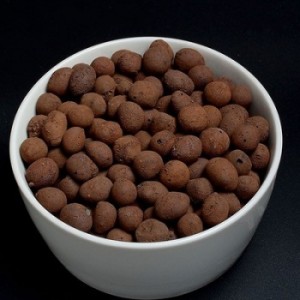
Hydroponic Growing Media Expanded Clay Balls
Specifications of LECA Clay Pebbles
Items
Result
Particle Size
2-4mm,4-8mm,8-16mm ect
Main Material
Clay
Apperance
Ball
Surface Density
1.1-1.2g/cm3
Bulk Density
300-350kg/m3
Rate of Floatage
95%
The sum of damage rate & Wear rate
3.0%
Accumulation porosity
20%
Hydrochloric acid can let rate
1.4%
Friction loss rate
2.0
Water Absorption
15%
Particle composition
60-63%
Horticultural Clay Pebbles is a perfect choice for growing strong, healthy plants. They’re 100 percent clay, which fosters premium aeration and drainage, as well as excellent pH and EC stability. The pebbles are also pre-washed, to ensure better stability. Expanded clay is a popular medium for both aquaponic and hydroponic gardening around the world. It is also known as Light Expanded Clay Aggregate, or LECA. Expanded clay is the inert hydroponics substrate of choice for professionals. It provides stability and the pebble has an ideal surface for roots and beneficial bacteria. The porous structure has a high water capacity and is suitable for both flood & drain and top irrigation systems. In aquaponic and hydroponic systems, soil is replaced by these natural clay pebbles, which are derived from a renewable and plentiful source (clay) so it is considered an ecologically sustainable medium. The clay is formed into pellets and then fired in rotary kilns at 1200Cº. This causes the clay to expand inside, like popcorn, and become porous. pH neutral, reuseable and structured like honeycomb – the porosity and surface area gives it ideal water retention qualities for growing.
-
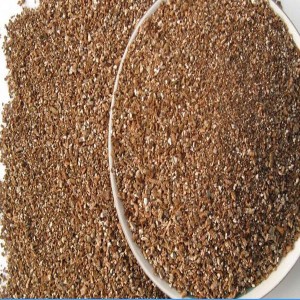
Expanded golden Vermiciulite for plant growing media
vermiculite has the following benefits
Inorganic, inert and sterile
Non abrasive
Ultra light weight
Free from disease, weeds and insects
Slightly alkaline (neutralized with peat)
High cation-exchange (or buffering exchange)
Excellent aeration characteristics
High water holding capacity
Insulating
Vermiculite is an incredibly useful growing medium. Horticultural vermiculite can be used for many beneficial
purposes in the garden and can aid and assist in successful propagation, cuttings and plant raising.
One of the best uses of vermiculite is the plant propagation arena. Vermiculite is particularly useful when
sowing fine to very fine seed. Instead of covering the seeds with a covering of compost, which can be very
heavy on tiny seeds and can also form a hard cap, making germination very difficult, a small quantity of
vermiculite can be used. This is very light and presents no restriction or check on growth, the seedlings can
easily break the surface and, because of the lightweight granular texture of vermiculite, it does not form a
cap on the top of the growing container or seed tray.
Vermiculite is also used widely in seed and potting compost mix, as well as with container plant pots, to
provide a lighter, more friable compost mix.
-
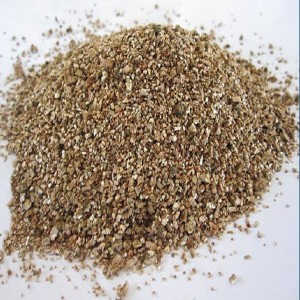
1-3mm Expanded Vermiculite
Product information : vermiculite
Vermiculite, chemical formula M g × (H2O) [Mg3 × (AlSiO3O10) (H2O)], is a magnesium water inclouded aluminum silicate
secondary metamorphic minerals of layered structure. It likes mica in form, and usually come from weathered or hydrothermal
alterated black (gold ) Mica. It will present a deflection shape after heat expansion and water loss, liking a leech pattern in form ,
so it gets the name vermiculite .
Vermiculite features
Raw vermiculite will be expanded to many times when heated at 850-1100 °C, poisonless, odorless , corrosion-resistant, Non-combustible , natural refractory properties , Good thermal insulation , low density , Heat-resistant ,sound-proofing .fire-proofing etc .
Vermiculite chemical :
Item SiO2 MgO Fe2O3 Al2O3 CaO K2O H2O PH Content % 37-42 11-23 3.5-18 9-17 1-2 5-8 5-11 7-11 Horticulture Vermiculite :
Vermiculite has been used by plantsmen, propagators, growers and gardeners for decades and our standard Vermiculite and Fine
Grade Vermiculite will allow you to improve your seed sowing germination rates and give your seed and potting compost mixes
the edge.
Supplied in easily manageable re-sealable bags, both grades of vermiculite - a naturally occuring non-toxic mineral - will benefit
seeds and seedlings; the standard is ideal for mixing with seed sowing and potting composts where it absorbs nutrients and
moisture before releasing them near the rootzone, whilst the fine grade is perfectly suited for raising and covering smaller seeds
where damaging soil temperature fluctuations are kept to minimum.
Simply mix the vermiculite with potting compost, use exclusively as a seed sowing medium or cover your seeds after sowing and
just watch the results!
-
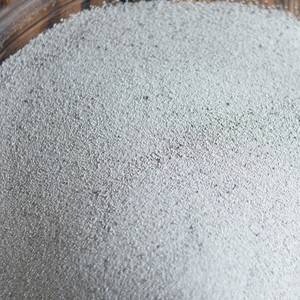
Lightweight Cenosphere Powder Ceramic Hollow Microspheres
Lightweight Cenosphere Powder Ceramic Hollow Microspheres
Lightening Agents Cenosphere Fly Ash Balloons
low density 0.35-0.45 g/cc
210-850um 500um 300um 150um 100um
-
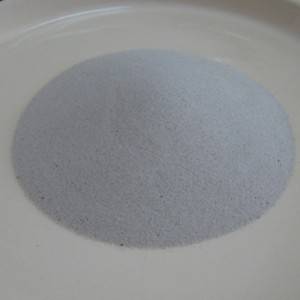
High Insulating Cenosphere Microballoons,Ceramic Microspheres
High Insulating Cenosphere Microballoons,Ceramic Microspheres
Lightening Agents Cenosphere Fly Ash Balloons
low density 0.35-0.45 g/cc
210-850um 500um 300um 150um 100um
-
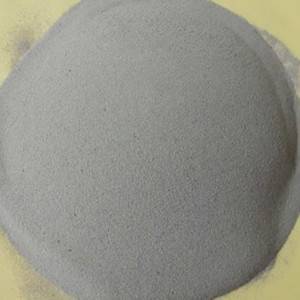
Thermal Insulation Cenosphere Coal Ash Microsphere
Thermal Insulation Cenosphere Coal Ash Microsphere
Cenosphere Fly Ash,Hollow Ceramic Microspheres
low density 0.35-0.45 g/cc
210-850um 500um 300um 150um 100um
-
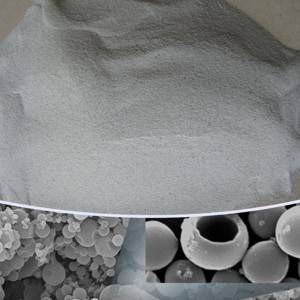
Refractory Cenospheres Ash Hollow Microspheres
Refractory Cenospheres Ash Hollow Microspheres
Hollow Ceramic Microspheres,Ash Cenosphere
low density 0.35-0.45 g/cc
210-850um 300um 150um 100um
-
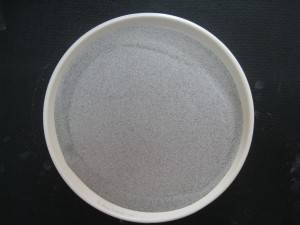
China Fly Ash Balloons/Floating Cenospheres
China Fly Ash Balloons/Floating Cenospheres
Hollow Ceramic Microspheres,Refractory Cenosphere
210-850um 300um 150um 100um
-
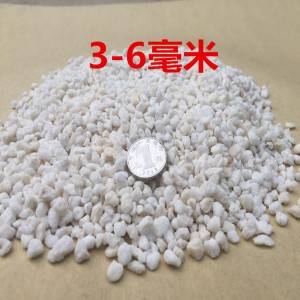
Horticultural Coarse Perlite,Perlite Horticultural Media
Horticultural Coarse Perlite,Perlite Horticultural Media
Growing Media Expanded Perlite
Horticulture Grade Perlite
4-8mm 3-6mm 2-4mm 1-3mm












